Off-page optimization is essential for boosting website authority and visibility in SEO. While on-page SEO focuses on internal elements, off-page SEO strategies, especially link-building, enhance credibility and drive organic traffic. As we enter 2024, quality backlinks will signal to search engines that your site is a trusted resource.
This article but OctopusWriters offers actionable techniques to enhance your link-building efforts. By understanding link types, engaging with industry influencers, and creating shareable content, these strategies can strengthen your off-page SEO and boost your brand’s reputation while driving organic traffic.
What is off-page SEO?
SEO (search engine optimization) off page involves various strategies designed to enhance a website’s organic search rankings without altering the site itself. These tactics are essential for improving visibility in search results and building a strong online presence. Common methods include link building, guest posting on reputable blogs, and utilizing social media marketing to drive traffic.
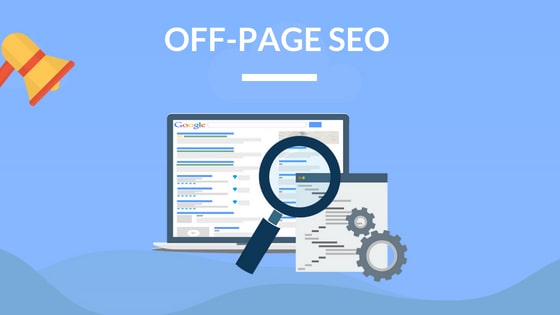
The primary goal of off-page SEO is to establish your website as trustworthy and authoritative in the eyes of search engines and users.
By acquiring high-quality backlinks and maintaining a positive online reputation, your site can achieve higher rankings, leading to increased traffic and conversions. Implementing effective off page strategies also fosters valuable relationships within your industry.
Why is off-page SEO important?
You might be wondering, “Why should I invest time in off-page SEO when I can focus solely on optimizing my website?” Here are some compelling reasons to consider:
Improved search engine rankings
Off-page SEO signals, especially backlinks from authoritative and relevant websites, are crucial for validating your site’s quality. These backlinks serve as endorsements, indicating to search engines that your content is trustworthy and valuable. When reputable sites link to your content, it enhances your site’s credibility and establishes it as a reliable source of information.
Search engines like Google heavily weigh these endorsements as essential ranking factors. This focus on high-quality backlinks can lead to improved search engine rankings, increased visibility, and more organic traffic. By actively cultivating strong backlinks, you strengthen your site’s reputation and authority within your industry.
Increased website visibility
Off-page SEO techniques, such as social media marketing and influencer outreach, are key to significantly enhancing your website’s reach and visibility. Picture your site as a hidden gem on a quiet street—without effective promotion, it will go unnoticed by potential visitors. By promoting your brand and content across external platforms, you not only draw in a larger audience but also strengthen your digital footprint and increase organic traffic.
Engaging with influencers, participating in online communities, and sharing valuable content on social media channels all contribute to building your brand’s credibility and authority. These efforts encourage others to share your content, link back to your site, and mention your brand, further improving your SEO rankings. Off-page SEO isn’t just about gaining backlinks—it’s about cultivating relationships, expanding your brand’s reach, and enhancing its reputation across the web.
By integrating these strategies, your site becomes more discoverable and respected, leading to long-term growth and sustained visibility in search results.
Enhanced user engagement
Engaging in off-page SEO activities, such as social media marketing, can significantly increase your brand’s visibility and user interaction. For instance, a well-crafted campaign on platforms like Instagram or Twitter encourages users to engage with your content through likes, shares, and comments. This not only amplifies your reach but also generates user-generated content, which can further enhance your brand’s presence online.
When users share your posts within their networks, your brand’s visibility expands organically, driving more traffic to your website. This increased traffic improves key performance metrics like session duration, bounce rate, and conversion rates, which signal positive user engagement to search engines. As a result, your site gains authority, leading to higher search rankings and more organic traffic over time.
Moreover, fostering an active online community around your brand strengthens credibility and builds trust with your audience. By regularly interacting with users on social media and responding to their needs, you create a loyal following that continues to engage with and promote your content. This cycle of engagement enhances your overall SEO efforts, helping your brand establish a lasting and influential online presence.
Building online reputation
Off-page SEO also involves managing your online reputation by monitoring and responding to customer reviews, feedback, and mentions. According to Google’s Quality Rater Guidelines, a website’s reputation outside its own pages plays a crucial role in determining its trustworthiness.
By proactively addressing customer concerns and fostering a positive reputation, you can build trust and credibility with both search engines and users, leading to improved rankings and increased brand recognition.
On-page SEO vs. off-page SEO
While off-page SEO focuses on optimization tactics applied outside your website, on-page SEO pertains to efforts made directly on your web pages. Both strategies are essential for enhancing your site’s overall performance in search engine rankings.
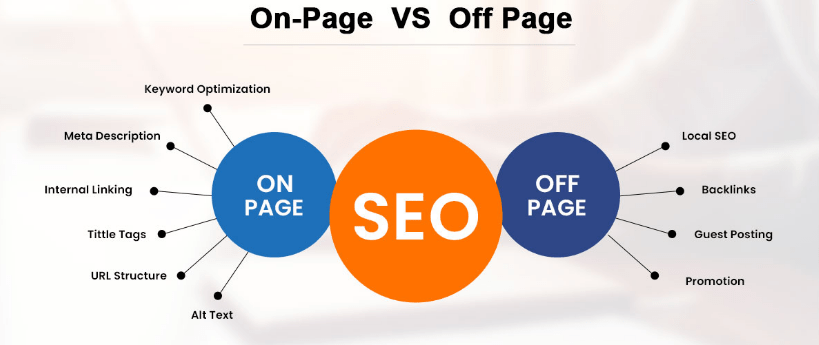
On-page SEO tactics include optimizing content, meta tags, headings, and images to improve relevance and user experience. In contrast, off-page SEO involves activities like link building, social media marketing, and acquiring online reviews to establish your site’s authority and reputation.
However, it’s also important to consider technical SEO. This aspect involves making site-wide technical improvements, such as enhancing security, optimizing loading speeds, and ensuring mobile-friendliness. These technical enhancements are crucial for improving your site’s search visibility and overall performance in search results.
By integrating on-page, off page, and technical SEO, you can create a comprehensive strategy that maximizes your website’s potential.
3 types of links for off-page SEO
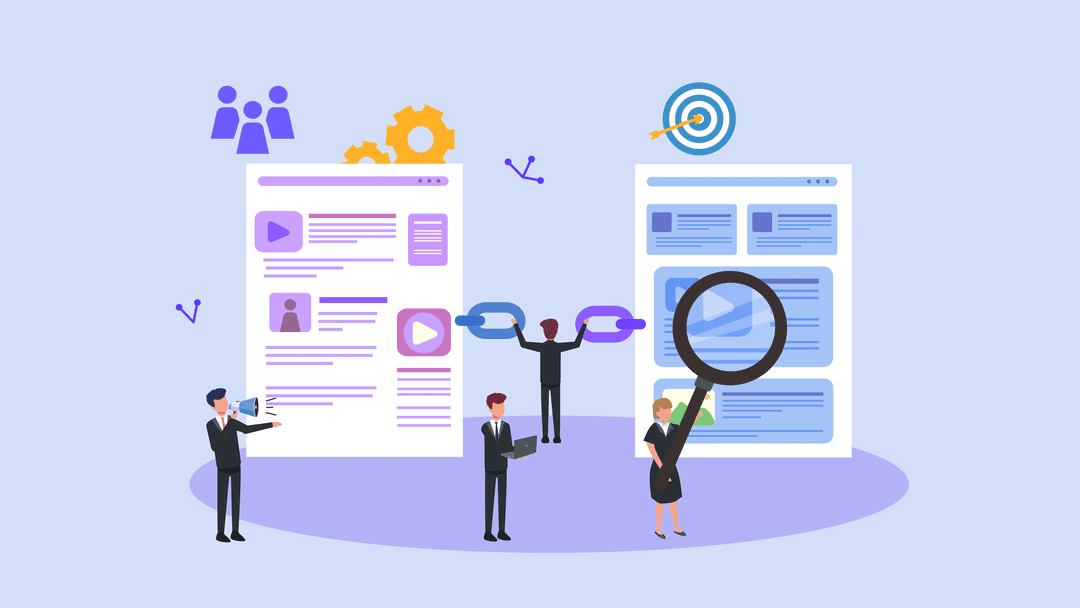
Links are a crucial component of off-page SEO, significantly impacting your website’s authority and search rankings. Before diving into backlink building or earning, it’s essential to understand the various types of links and the factors that influence their equity regarding your website. Here’s a detailed look at each type:
Natural Links
Natural links are highly valuable for off-page SEO because they are earned organically, without your team having to reach out or ask for them. These links occur when a website or content creator voluntarily references your site, typically because they find your content useful, authoritative, or insightful.
Imagining a well-known industry blogger coming across your in-depth guide on digital marketing. If they choose to mention or link to your article in one of their posts as a resource, that’s considered a natural link. The fact that they found your content worthy of reference speaks volumes about its quality.
Natural links are powerful because they reflect genuine recognition from others in your field and help elevate your website’s authority in the eyes of search engines. Over time, this kind of organic validation boosts your rankings, helping you gain more visibility and credibility within your industry. Natural links are a core part of sustainable link-building strategies, as they align with search engine guidelines and demonstrate authentic engagement from your peers.
Built Links
Built links are earned through proactive outreach efforts from your team. This process involves reaching out to webmasters, publishers, or journalists to secure a link back to your website. You may have promoted your content through an ad campaign to increase its visibility, helping users discover it more easily.
While you actively worked to obtain this link, it’s essential to note that you provided valuable content for users in the process. Built links showcase your commitment to quality and can positively influence your site’s authority and search engine rankings. If you create an in-depth guide and share it with industry influencers who link to it on their platforms, you’re using built links effectively. This strategy allows you to gain authoritative backlinks, improving your SEO and enhancing your site’s credibility within your niche.
Created Links
Created links are those your team generates directly by submitting content to directories, forums, or issuing press releases, with the intention of building backlinks to your website. Unlike natural or built links, these links are not acquired organically or through outreach. While creating links this way may seem like a simple shortcut to increasing your backlink profile, this method is often viewed with skepticism by search engines.
Search engines tend to view created links as low-quality or even spammy, especially if the platforms where these links appear are not closely related to your industry. Because of this, the overuse of created links is frequently associated with black-hat SEO tactics, which can negatively impact your website’s credibility. Search engines may even penalize sites that rely heavily on created links for artificial ranking boosts, reducing your chances of long-term success.
In contrast, natural and built links hold more value because they demonstrate genuine recognition of your content from others within your niche. By prioritizing these forms of backlinks, you not only protect your site from potential penalties but also improve its authority and relevance in search engines’ eyes.
Understanding the different types of links is critical for any off-page SEO strategy. Focusing on high-quality, natural, and built links will help you create sustainable growth and positively impact your website’s authority and ranking over time, while created links, if overused, could lead to more harm than good. Prioritize efforts that align with search engine guidelines and foster authentic engagement to strengthen your online presence.
6 factors that influence link value for off-page SEO
When building links for your off-page SEO strategy, consider the equity and authority each link passes to your website. While attracting numerous low-value links from spammy sites may seem appealing, they won’t enhance your search rankings and can even harm your credibility. It’s crucial to focus on trusted websites with strong link equity.
Several factors influence the equity passed by a link:
- Anchor Text: Using descriptive and relevant anchor text enhances contextual relevance and helps search engines better interpret your site’s content.
- Freshness or Age of the Link: New links indicate current relevance, while older links may suggest long-term credibility.
- Number of Links on the Linking Page: Fewer outbound links on a page generally pass more link equity to each destination.
- Relevance of Subject Matter: Links from sites with related content are more valuable, as they suggest your content is relevant to their audience.
- Trustworthiness of the Linking Site: Links from reputable sites carry more weight and enhance your site’s credibility.
- Authority of the Linking Site and Page: Links from high-authority domains are more beneficial than those from low-authority sources.
How to do off-page SEO?

Implementing effective off-page SEO strategies is crucial for enhancing your website’s visibility, authority, and overall online presence. Here’s a comprehensive step-by-step guide to help you navigate this process effectively:
Identify your goals: Define specific objectives, such as increasing brand awareness, boosting organic traffic, or improving search rankings. For example, aim for a “20% increase in referral traffic from industry blogs this quarter.”
Implement tracking: Use analytics tools like Google Analytics to monitor key performance indicators (KPIs) relevant to your goals, such as referral traffic and conversion rates. Adjust strategies based on performance insights.
Identify your assets: Evaluate valuable content or services that deserve links and engagement, like blog posts or infographics. Knowing your assets guides your promotion and outreach efforts.
Activate your assets: Promote your assets through publishing articles, sending link requests, guest blogging, and encouraging customer reviews. Keep a record of campaigns for tracking progress.
Measure results: Regularly assess your performance against benchmarks. Document successes and insights to refine strategies for future campaigns. Be prepared to pivot if certain tactics underperform.
By diligently following these steps, you can create a strong off-page SEO strategy that boosts your brand’s visibility and authority. Remember that this is an ongoing process requiring consistent effort and adaptability.
The digital landscape evolves constantly, so regularly evaluating your goals and tracking performance will ensure your strategy remains effective. This proactive approach helps maintain your online reputation and fosters stronger audience relationships, leading to increased organic traffic and higher conversion rates. Ultimately, a well-executed off-page SEO strategy contributes to sustainable growth and positions your brand as a credible authority in your industry.
Off-page SEO checklist with backlinks
When it comes to off-page SEO, backlinks are crucial for your website’s success.
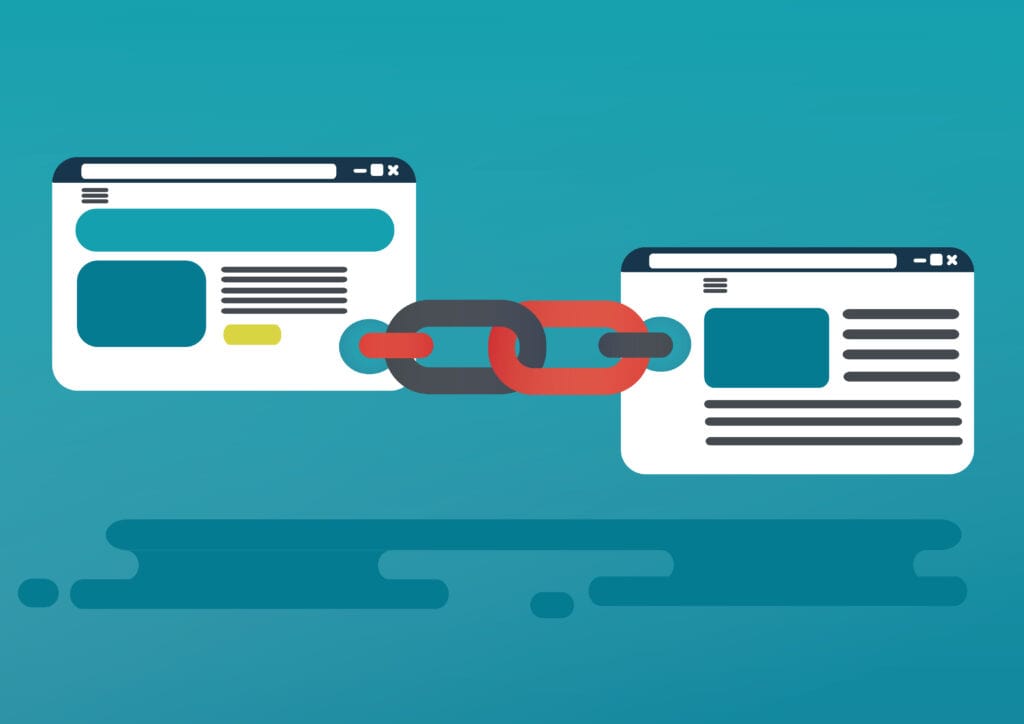
That said, the focus should always be on quality rather than quantity. To effectively improve your rankings in the SERPs, the backlinks you build must come from authoritative sites that are relevant to your niche.
OctopusWriters will guide you through effective strategies for building authoritative links that are proving successful in the current landscape.
Be a data source
Positioning your website as a credible data source can significantly enhance your off-page SEO efforts. By creating original research, statistics, or insightful data related to your industry, you provide valuable content that others are likely to reference in their own articles, blogs, or reports.
When your content includes unique statistics or compelling insights, it becomes more shareable and authoritative. As a result, other websites and influencers are more inclined to link back to your site to support their claims or enhance their content, ultimately boosting your site’s authority and search engine rankings.
This strategy not only increases your backlink profile but also establishes your brand as a trusted resource within your niche.
Broken link building
Broken link building is a highly effective off-page SEO strategy that focuses on enhancing your backlink profile. This process involves identifying broken links on various websites and reaching out to the site owners to inform them about the issue.
Imagine you discover a broken link on a reputable blog that leads to a now-unavailable resource about SEO tools. In your outreach, you can inform the blogger about the broken link while also suggesting your own article that covers similar or even more up-to-date information. This not only helps the blog owner enhance their user experience by reducing 404 errors but also provides you with a valuable backlink.
Broken links can occur for various reasons, including expired web hosting, issues during site migration, or typographical errors. To mitigate the risk of broken links on your own site, it’s crucial to choose a reliable web hosting provider and carefully proofread your content before publication. This proactive approach can improve your site’s authority and ensure a better user experience for your visitors.
Unlinked brand mentions
Unlinked brand mentions occur when your brand is mentioned online without a clickable link. These mentions offer a great opportunity for acquiring backlinks, as many publishers are willing to add links if asked.
To increase your chances of success, focus on:
- Reputable Sources: Target news sites and blogs instead of forums or social media.
- Recent Mentions: Look for references made in the last 30 days to ensure relevance.
- Positive Sentiment: Prioritize articles that mention your brand positively.
Double down on long-form content
Will publishing long-form content automatically attract links? Not necessarily. However, it does enhance the likelihood of earning them. Our analysis of over 900 million blog posts found that long-form content receives 77% more links compared to shorter posts. This statistic highlights the importance of depth and detail in content creation when aiming for backlinks.
The success of long-form content can be attributed to the comprehensive insights it offers. Readers are more likely to find value in detailed articles that cover a topic thoroughly, leading them to reference and share the content within their networks. Additionally, content creators often seek credible sources to support their own work, making well-researched, in-depth articles an attractive choice for linking.
Moreover, longer articles tend to perform better on social media, increasing their visibility and creating more opportunities for backlinks. By investing in quality, long-form content, you not only provide value to your audience but also significantly improve your chances of building a robust link profile, ultimately enhancing your site’s authority and search rankings over time.
Strategic guest posting
Guest blogging can significantly enhance your off-page SEO in several ways. First, it allows your brand to reach a new audience, which can increase branded searches. By publishing content on another site, you tap into their established readership, potentially attracting new visitors to your own website.
Second, guest posts can lead to unlinked brand mentions. While these mentions are not as impactful as backlinks, they still contribute positively to your brand visibility, helping to establish your authority in your field.
Finally, guest posts can generate backlinks, which, from our experience, do contribute to improving your rankings, albeit in moderation.
However, it’s essential to note that this strategy is most effective when you publish guest posts on reputable sites within your industry. These sites don’t have to be in your exact niche but should be related enough to be relevant to your audience.
One example being, a digital marketing agency might publish a guest post on a well-known business blog discussing the importance of SEO strategies for startups. This guest post not only showcases the agency’s expertise but also provides a link back to its website. The readers of the business blog, who are often startup founders looking for marketing insights, may then visit the agency’s site for more information. As a result, the agency gains increased traffic, enhances its credibility, and potentially earns new clients—all while contributing valuable content to the host site.
Generate brand signals to improve off-page SEO

Now, let’s discuss a super underrated aspect of off-page SEO: Brand Signals.
Brand signals are the indicators Google uses to determine whether your site represents a legitimate brand. These signals include factors such as brand mentions across various platforms, social media engagement, reviews, and overall online presence.
By fostering a strong brand reputation and encouraging positive engagement, you can enhance your credibility in the eyes of search engines, ultimately benefiting your SEO efforts.
Brand mentions
Brand mentions are a crucial element of off-page SEO, contributing to your online reputation and authority. These references can come in various forms, such as unlinked mentions on social media, blogs, or news articles. Even when a brand is mentioned without a hyperlink, it still serves as a positive signal to search engines and users alike. By monitoring and encouraging these mentions, brands can enhance their credibility and visibility in their respective industries.
Unlinked Mentions: An unlinked mention of your brand by a reputable site acts as a positive endorsement, signaling to search engines that your brand is recognized and valued within your industry. While these mentions do not provide direct link equity, they can still significantly boost your brand’s visibility and authority.
Monitoring these mentions through tools like Google Alerts or social listening platforms allows you to engage with the audience, showing appreciation for their recognition and encouraging further interaction with your brand.
Engage in PR activities: Engaging in public relations activities, such as collaborating with media outlets, bloggers, and influencers, can greatly enhance your brand’s visibility. By participating in PR efforts—like issuing press releases, conducting interviews, or contributing guest posts—you increase the likelihood of your brand being mentioned in various platforms. This not only enhances your reputation but also builds trust with potential customers.
Consistent NAP (Name, Address, Phone Number)
Ensure that your business’s NAP (Name, Address, Phone Number) details are consistent across all online directories, social media platforms, and your website. Consistency in these core details is crucial for improving your local SEO and helps search engines verify your business’s legitimacy, ultimately boosting your visibility in search results. Regularly auditing and updating your NAP information can enhance your brand’s credibility and reduce confusion for potential customers.
If you own a local bakery named “Sweet Treats Bakery,” it’s essential that the name, address, and phone number appear consistently as “Sweet Treats Bakery, 123 Main St, Anytown, USA, (123) 456-7890” across platforms like Google My Business, Yelp, Facebook, and your own website. If one directory lists the address as “123 Main Street” instead of “123 Main St,” or if another platform has a different phone number, it could confuse potential customers and affect your local search rankings. By ensuring that your NAP details are uniform across all platforms, you enhance your local SEO efforts, making it easier for customers to find and contact your bakery.
Brand affiliations and partnerships
Collaborate with reputable brands within your industry for joint campaigns, webinars, or events. These partnerships can help you tap into a broader audience, increase your brand’s visibility, and establish trust through association.
Displaying logos of partner brands, certifications, or awards on your website also boosts credibility by signaling to users and search engines alike that your brand is recognized and endorsed by other trusted entities. This approach not only strengthens your off-page SEO efforts but also enhances your brand’s overall reputation in the industry.
User engagement
Creating shareable content is crucial for driving user engagement and amplifying your brand’s reach across various platforms. To enhance the shareability of your content, focus on integrating eye-catching visuals, insightful statistics, and clear calls to action.
As an illustration, an infographic created by WordStream received a link from CNN, which significantly increased its traffic. Additionally, infographics can generate 37.5% more backlinks compared to standard blog posts, highlighting their importance in your off-page SEO strategy. Monitoring engagement metrics, such as bounce rate and time spent on site, allows you to gauge how users interact with your content. High engagement levels suggest that users find your content valuable, which can lead to more shares, greater visibility, and a stronger online presence for your brand.
Audit your branded searches
Branded searches refer to the number of times people search specifically for your brand on Google. This includes exact searches for your brand name (like “OctopusWriters”) as well as variations that include additional keywords or phrases related to your brand (such as “OctopusWriters SEO”).
Tracking branded searches is valuable because it reflects how familiar and interested people are in your brand. You can easily monitor this data through the Google Search Console Performance Report, which provides insights into the keywords driving traffic to your site and shows how often users search for your brand directly.
Invest in YouTube
YouTube marketing is an effective way to boost your Brand Signals and branded searches.
First, your videos can reach a large audience. For instance, my videos attract 320,000 unique viewers monthly, increasing discussions about my brand. A popular social account can also enhance your brand’s credibility.
Second, viewers often search for your brand on Google after watching your videos. While YouTube limits direct navigation to your site, successful videos can lead to significant increases in branded searches, showing a clear link between views and search volume.
Quality backlink profile
Focus on obtaining backlinks from reputable, industry-relevant websites. These high-quality backlinks can significantly boost your brand’s authority by signaling to search engines that your content is trusted and valued within your industry. By cultivating a strong backlink profile, you not only enhance your search rankings but also build credibility among users and peers, which can lead to increased organic traffic and further link-building opportunities.
Set up brand tracking
Setting up brand tracking is essential for understanding how your brand is perceived across various online platforms. This process involves monitoring how often your brand is mentioned on news sites, blogs, and forums, providing valuable insights into your brand’s visibility and reputation. By consistently tracking these mentions, you can observe trends over time, allowing you to assess the effectiveness of your marketing efforts and campaigns.
Regular analysis of brand mentions can reveal insights into public sentiment toward your brand, as positive mentions can indicate favorable perceptions, while negative comments may highlight areas that require improvement.
Moreover, identifying influential sources discussing your brand enhances your credibility in the online landscape. Knowing where conversations about your brand are happening allows you to engage with these sources, fostering relationships that can lead to increased brand visibility and trust. Overall, effective brand tracking not only keeps you informed about your online presence but also equips you with the necessary insights to strengthen your reputation and adapt your strategies as needed.
Improve E-A-T

E-A-T (Expertise, Authoritativeness, Trustworthiness) has rapidly emerged as a critical off-page SEO ranking factor, particularly in fields like health and finance, where trust is paramount. While many believe that simply adding author bios can enhance E-A-T, the reality is that Google evaluates this factor through a range of external signals that extend well beyond your website. This includes your brand’s reputation across various platforms, the quality of backlinks from authoritative sources, and the overall perception of your expertise within your industry.
To truly improve your site’s E-A-T, it’s essential to adopt a comprehensive strategy that encompasses various aspects of your online presence. This part will explore actionable tactics for enhancing your E-A-T, from building relationships with industry influencers and securing media mentions to creating high-quality content that resonates with your audience. By understanding and implementing these strategies, you can significantly boost your site’s authority and credibility, leading to better search engine rankings and increased trust from your users.
Get brand mentions on authority sites
Securing brand mentions on authoritative sites is vital for enhancing your brand’s credibility and online visibility. These endorsements serve as trust signals for both users and search engines, reinforcing your brand’s reliability.
To achieve this, focus on building meaningful relationships with industry influencers, journalists, and thought leaders.
As a case in point, if your brand is mentioned in a renowned publication like Harvard Business Review, it not only boosts your visibility but also elevates your brand’s reputation. Craft valuable content that resonates with your audience and positions your brand as a knowledgeable authority in your field. Actively participate in industry discussions, provide expert commentary, and strategically use press releases to highlight noteworthy brand achievements.
By consistently positioning your brand as a thought leader, you increase the likelihood of earning mentions on high-authority sites, which can ultimately enhance your brand’s reputation and search rankings.
Get links from trusted “Seed Sites”
Google continues to rely on PageRank to evaluate E-A-T (Expertise, Authoritativeness, Trustworthiness), extending beyond just looking at Domain Authority. A 2018 Google patent explains that more weight is placed on links from a select group of “seed sites.”
If you manage to get a link from a trusted seed site like TechCrunch, this can significantly enhance your website’s authority. While links from top authority sites like Forbes are undoubtedly valuable, acquiring links from sites that are linked to by these major players can also contribute to strengthening your E-A-T. This process, similar to a revamped version of TrustRank, allows Google to assess trust and authority more precisely.
Get positive reviews online
Google’s Quality Rater guidelines prioritize online reviews, as negative feedback can hinder your site’s visibility. For local businesses, positive reviews are essential for local SEO and contribute to your site’s E-A-T.
As an example, a local restaurant that consistently receives positive reviews on platforms like Google My Business and Yelp can significantly improve its local search rankings. For blogs or media sites, Google evaluates E-A-T through awards received and the views of industry experts about your website, which influences its perceived credibility. By actively encouraging satisfied customers to leave positive reviews and showcasing these testimonials, you not only enhance your online reputation but also improve your overall search visibility.
Bonus off-page SEO techniques
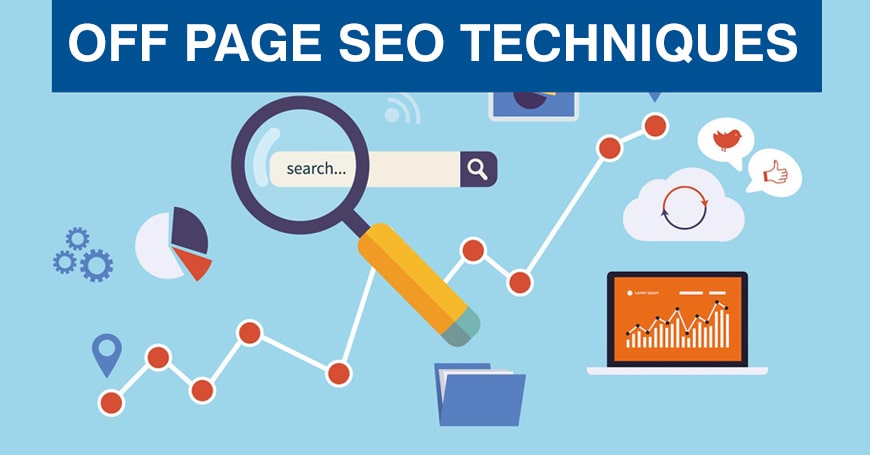
Content marketing
Content marketing plays a crucial role in off-page SEO by attracting backlinks, media attention, and demonstrating E-A-T (Expertise, Authoritativeness, Trustworthiness). Distributing your content across various channels can amplify these off page signals. Here are effective methods for content distribution:
Digital PR
Digital PR blends traditional public relations with SEO tactics to secure high-quality backlinks. This strategy boosts brand visibility, drives referral traffic, and enhances your brand’s credibility and authority online. By crafting compelling stories and engaging with media outlets, you can build valuable relationships that lead to coverage in reputable publications. This not only improves your search rankings but also establishes trust with users and search engines alike. Ultimately, effective digital PR helps expand your reach and strengthens your online presence.
Social media
While social media doesn’t directly affect Google rankings, it’s a powerful tool for increasing visibility. The more your content is shared across social platforms, the more traffic and potential backlinks you can generate.
Even without immediate links or traffic, increased attention can lead to more branded searches and mentions, benefiting your off-page SEO.
In today’s fast-paced digital landscape, managing social media can be challenging for busy business owners. However, AI-powered tools have made it easier than ever to maintain an engaging social media presence.
Influencer marketing
Influencer marketing leverages collaborations with popular bloggers and social media creators to promote your products or services. It’s an effective strategy for building brand awareness, amplifying content, and reaching new audiences.
Influencers have substantial followings and can help position your brand across relevant platforms.
Podcasts
Podcasts are increasingly popular and offer valuable marketing opportunities. Many businesses overlook them, giving you a competitive edge.
Podcasts help you reach new audiences and showcase your expertise. As a guest, you could earn backlinks to your site, and relevant shows may mention your content in their descriptions. If you know a podcast’s focus, suggest linking to your material in their show notes.
Content syndication
Republishing your content on platforms like Medium or LinkedIn can introduce your brand to new audiences. To protect your original content’s ranking, ensure that syndicated versions link back to your site and utilize canonical tags to indicate the original source.
Forums
While posting links in forums won’t boost your Google rankings, engaging in discussions relevant to your expertise can establish you as an authority.
Forums provide a unique platform for open conversations with potential customers who are already seeking information related to your offerings. This interaction helps build relationships and trust. If community members show interest, you can share relevant content to further support their inquiries.
Local SEO
Local SEO is vital for businesses targeting customers within a specific area. It optimizes your online presence to increase traffic, visibility, and brand recognition locally, especially for small businesses that depend on nearby clientele.
A significant aspect of local SEO is your Google Business Profile (GBP), which influences how your business appears in Google search results and Maps. An optimized GBP can significantly boost visibility, particularly in high-traffic areas like the Google Map Pack for searches such as “plant store near me.”
Tips for Optimizing Your Google Business Profile (GBP):
- Ensure Accurate Contact Information: Keep your business name, address, and phone number consistent across platforms.
- Respond to Reviews: Engage with customers by responding to both positive and negative reviews to enhance your reputation.
- Publish Regular Updates: Share posts about promotions or events, incorporating engaging visuals like photos and videos.
- Use Relevant Keywords: Include keywords related to your business in the description to improve searchability.
- Add Business Categories: Choose categories that accurately reflect your services for better search connections.
- Manage Q&A: Actively provide answers to common customer questions in the Q&A section.
- Enable Messaging: Allow customers to message you directly for quick communication.
- Encourage Customer Photos: Motivate customers to share their experiences through photos to boost engagement.
- Monitor Insights: Regularly check GBP insights to understand customer interactions and adjust your strategy accordingly.
- Stay Active: Keep your listing fresh with consistent updates.
By implementing these tips, you can enhance your local SEO and improve your visibility in search results. For more strategies, explore our guide on Google Maps marketing.
Events
Events are powerful tools for engaging your audience and generating buzz for your business. Hosting a workshop, webinar, or conference allows for direct interaction, fostering relationships and creating memorable experiences that resonate with attendees long after the event concludes.
As you promote your event, you can earn brand mentions across social media platforms, with attendees often sharing their experiences in real-time. Many participants may also write summary articles on their own websites, enhancing your brand’s visibility and attracting backlinks. This organic buzz helps establish your business as a thought leader in your industry.
Your event landing page can further enhance your link-building efforts, especially if speakers or influencers share it with their audiences. While organizing events requires significant planning, the unique excitement they generate is often unmatched by traditional marketing strategies. Additionally, events can attract media attention and industry experts, providing valuable PR coverage that boosts your off-page SEO.
Repurposing content
Each social media platform has unique content preferences: Instagram is now focused on reels, YouTube specializes in videos, and Facebook and Twitter are ideal for sharing thoughts.
We often promote our content on Facebook and Twitter but neglect its potential on YouTube and Instagram. Specifically, if you’ve written a guide on optimizing email campaigns, consider creating a video that summarizes the main points and linking back to your article in the description.
This way, Google users find your article, while YouTube users access your video. Always repurpose content to fit each platform’s strengths, maximizing engagement across networks.
Questions & answers
Creating valuable content for question-and-answer sites like Stack Overflow, Quora, and Yahoo Answers is a powerful way to enhance your authority. By selecting a high-authority platform, you can find niche-related questions and offer insightful answers that resonate with the community. This not only positions you as an expert in your field but also creates opportunities for engagement with a wider audience.
For example, if you answer a technical question on Stack Overflow about a programming issue, you could reference your website for additional resources or guides. Ensure that your response is genuinely helpful and relevant, as including links that appear spam can diminish your credibility. When done right, contributing to these platforms can significantly enhance your off-page SEO, driving traffic back to your site while establishing your brand as a trusted authority in your industry.
Social bookmarking
Social bookmarking can effectively attract visitors and boost engagement with your content. While its long-term value is debated, platforms like StumbleUpon, Delicious, Digg, and Reddit remain popular for sharing and discovering resources. These platforms allow users to save and share links, making them valuable for driving traffic.
To maximize impact, start with an eye-catching tagline that captures your content’s essence. Ensure your content is high-quality and informative, as engaging articles are more likely to be shared. Actively participate in the community by commenting on and sharing others’ posts, fostering relationships that encourage reciprocal sharing.
By combining a strategic approach with valuable content, social bookmarking can significantly enhance your visibility and drive traffic to your site.
Off-page SEO- Frequently Asked Questions
What is the head of off-page SEO?
As the Head of off-page SEO, you’ll develop and execute strategies to boost organic traffic and improve search rankings for our clients. This includes identifying link-building opportunities, enhancing brand visibility, and optimizing outreach efforts while collaborating with internal teams and external partners.
What is an off page citation for SEO?
In off-page SEO, a citation is a reference to your business’s Name, Address, and Phone Number (NAP) on external sites, directories, or online platforms. This helps improve local search rankings and validates your business information across the web.
What is another name for off-page SEO?
off-page SEO encompasses various strategies like Digital PR, link building, and outreach. The primary objective remains consistent: to acquire relevant backlinks and improve organic rankings, ultimately driving traffic and attracting potential customers to your business.
What is the difference between off page and technical SEO?
off-page SEO focuses on external factors to boost a website’s authority and rankings, like backlinks and social media engagement.
Technical SEO optimizes the website’s internal structure for better crawling and indexing, addressing elements like site speed, mobile-friendliness, and security.
Both are crucial for improving search engine visibility.
What is an off-page SEO tool?
An off-page SEO tool enhances a website’s authority through external factors. Key features include:
- Backlink Analysis
- Social Media Monitoring
- Competitor Analysis
- Content Promotion
- Citations Management
Popular options are Ahrefs, Moz, and SEMrush.
Conclusion
Off-page SEO is essential for improving your site’s authority and visibility. By focusing on techniques like link building, social media engagement, and digital PR, you can enhance your online presence and drive more organic traffic. For more insights on optimizing your off-page SEO strategy, visit OctopusWriters.

